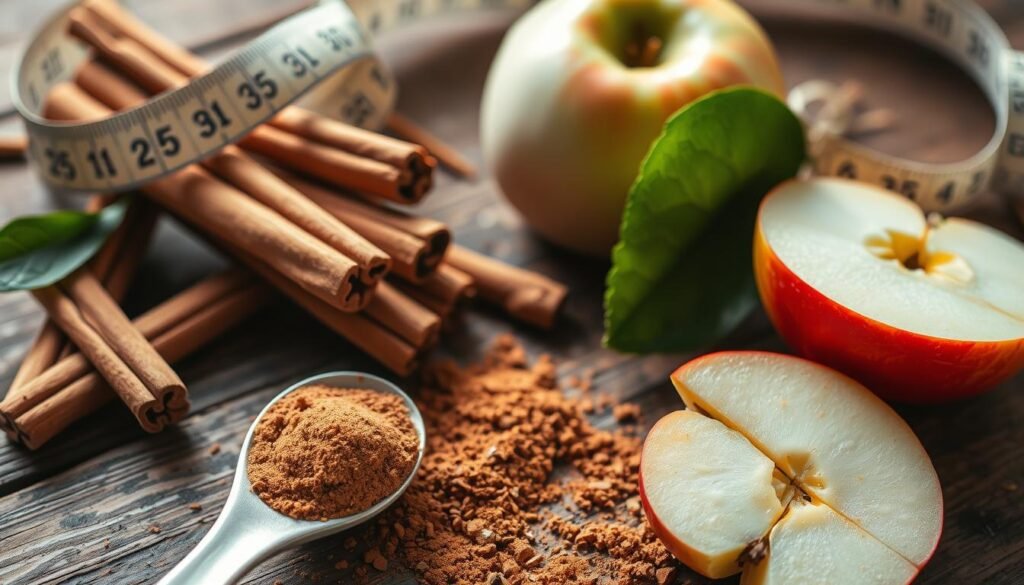Did you know that cinnamon might be a key to better health? It can help with inflammation and even support weight loss. As you learn about cinnamon, you’ll see how it has been used for centuries. It’s a simple spice that can greatly improve your health.
Key Takeaways
- Discover the rich history and cultural significance of cinnamon as a medicinal spice
- Learn about the different types of cinnamon and their unique benefits
- Understand the chemical composition and bioactive compounds of cinnamon
- Explore the powerful antioxidant properties of cinnamon and its role in blood sugar management
- Find out how to incorporate cinnamon into your daily diet to support weight loss and overall health
- Learn about the potential side effects and safety considerations of consuming cinnamon
The Ancient History of Cinnamon as Medicine
Cinnamon has been a treasured spice for centuries. Its medicinal properties have been used in many cultures. You can see how different civilizations used cinnamon in ancient medicine. The history of cinnamon is filled with stories from various cultures and traditions.
Exploring cinnamon, you’ll learn about its cultural significance in ancient medicine. It was valued in ancient China and medieval Europe for its taste and health benefits. People used cinnamon to treat many health issues, like digestive and respiratory problems.
Traditional Uses Across Civilizations
- Ancient Egyptians used cinnamon for both medicine and cooking.
- In traditional Chinese medicine, cinnamon helps with colds and flu.
- In Ayurvedic medicine, cinnamon is thought to warm the body and balance energy.
The journey of cinnamon from ancient times to modern medicine is interesting. Scientists have found out more about its medicinal properties. As research shows cinnamon’s benefits, it’s becoming more popular as a natural remedy. By knowing how cinnamon was used in the past, you can use it to improve your health today.
Understanding Different Types of Cinnamon
Exploring cinnamon reveals several types, each with its own benefits. The type of cinnamon affects its benefits. Knowing these differences helps you pick the best cinnamon for you.
Quality matters when it comes to cinnamon. Each type has a unique flavor, aroma, and nutritional value. For example, Ceylon cinnamon is mild and sweet. Cassia cinnamon is stronger and more bitter. Indonesian cinnamon is warm and spicy.
Here are some key differences between the main types of cinnamon:
- Ceylon cinnamon: mild and sweet flavor, high in antioxidants
- Cassia cinnamon: strong and bitter flavor, commonly used in baked goods
- Indonesian cinnamon: warm and spicy flavor, often used in savory dishes
Understanding cinnamon types and their characteristics unlocks cinnamon’s full benefits. Whether for flavor or nutrition, choosing the right type is key.
The Scientific Benefits of Cinnamon in Your Diet
Cinnamon is a spice with many scientific benefits. It can help with weight loss and managing diabetes. It improves blood sugar levels and insulin sensitivity.
Chemical Composition
Cinnamon has compounds like cinnamaldehyde. This compound has anti-inflammatory properties. It can be a natural remedy for many health issues.
Bioactive Compounds
Cinnamon has compounds that lower blood sugar and improve insulin sensitivity. It’s good for people with diabetes. It also helps with weight loss by reducing hunger and boosting metabolism.
Nutrient Profile
Cinnamon is full of nutrients like fiber, manganese, and calcium. It also has antioxidants that protect cells and reduce inflammation. Adding cinnamon to your diet can help with weight loss and diabetes management.
Cinnamon’s Powerful Antioxidant Properties
Cinnamon is famous for its antioxidant properties. These properties help protect the body from harmful free radicals and oxidative stress. By learning about cinnamon, you’ll see how it fights free radicals and lowers inflammation.
Some key benefits of cinnamon’s antioxidants include:
- Lowering the risk of chronic diseases like heart disease and cancer
- Protecting against neurodegenerative disorders like Alzheimer’s and Parkinson’s
- Boosting overall health and well-being
Adding cinnamon to your meals can unlock its antioxidant properties. It’s not just tasty but also good for you. Cinnamon is great in both sweet and savory dishes.
Cinnamon’s antioxidant properties have been shown to have a positive impact on overall health, making it an excellent addition to a healthy diet.
How Cinnamon Supports Blood Sugar Management
Cinnamon can help manage blood sugar levels, making it good for diabetic patients. It has cinnamon anti-inflammatory properties that help control blood sugar. Research shows cinnamon can help keep blood sugar in check.
Insulin sensitivity is key for managing blood sugar. Cinnamon can make cells more receptive to insulin. This helps glucose get into cells better, keeping blood sugar levels stable. This is especially good for people with diabetes.
- Improving insulin sensitivity, which helps glucose enter cells more efficiently
- Regulating blood glucose levels, reducing the risk of spikes and crashes
- Providing antioxidant properties, which help protect against cell damage
Impact on Insulin Sensitivity
Cinnamon’s effect on insulin sensitivity is a big plus for blood sugar control. It helps lower the risk of type 2 diabetes. It also helps manage diabetes in those already diagnosed.
Benefits for Diabetic Patients
Cinnamon is great for diabetic patients. It helps keep blood sugar levels stable and improves insulin sensitivity. Always talk to a doctor before adding cinnamon to your diet, especially if you’re on medication.
Cinnamon’s Role in Weight Loss and Metabolism
Cinnamon might help with weight loss and metabolism. It can boost metabolism and suppress appetite. This is because it affects fat burning and glucose metabolism.
Here are some ways cinnamon can help with weight loss:
- Increases metabolism to burn more calories
- Reduces appetite and cravings for sweets
- Improves insulin sensitivity to regulate blood sugar levels
Adding cinnamon to a healthy lifestyle can aid in weight loss. A balanced diet and regular exercise are key. Cinnamon’s health benefits and uses make it a great weight loss tool.

Adding cinnamon to your diet can positively impact your weight loss journey. Its many health benefits make it a smart choice for better health.
Anti-inflammatory Effects and Immune System Support
Cinnamon has anti-inflammatory properties that help reduce inflammation and support the immune system. It’s a great addition to your diet, offering many benefits. Adding cinnamon to your meals can help lower the risk of chronic diseases like arthritis.
Studies show cinnamon can lower inflammation by reducing cytokines, which are harmful molecules. This decrease in cytokines can help reduce inflammation, offering relief from arthritis. Cinnamon also boosts the immune system, helping protect against infections and diseases.
Inflammation Reduction Mechanisms
Cinnamon’s anti-inflammatory effects come from its ability to lower pro-inflammatory molecules like cytokines and chemokines. This reduction in these molecules can decrease inflammation, offering relief from arthritis. Cinnamon also strengthens the immune system, providing protection against infections and diseases.
Immune System Enhancement
Cinnamon boosts the immune system, helping protect against infections and diseases. Its ability to reduce inflammation and enhance the immune system makes it a great dietary addition. Adding cinnamon to your meals can help lower the risk of chronic diseases.
In summary, cinnamon’s anti-inflammatory effects and immune system support make it a great dietary choice. Its medicinal properties and benefits can help prevent chronic diseases like arthritis. It also offers protection against infections and diseases.
Heart Health Benefits and Cardiovascular Protection
Cinnamon may help your heart health by lowering the risk of heart disease. Adding cinnamon to your meals could help control blood pressure and cholesterol. This can make your heart healthier, especially when you also eat well and exercise regularly for cinnamon for weight loss and management.
Here are some ways cinnamon helps your heart:
- It reduces inflammation, which is linked to heart disease.
- It improves blood lipid profiles, helping to lower cholesterol.
- It aids in managing blood sugar, which is good for cinnamon for diabetes control.
Adding cinnamon to your diet is a smart move for your heart health. Always talk to a doctor before changing your diet or exercise routine.
How to Incorporate Cinnamon Into Your Daily Diet
To enjoy cinnamon’s health perks, like its cinnamon antioxidant properties and cinnamon anti-inflammatory properties, add it to your daily meals. Start by sprinkling a pinch of cinnamon on your morning coffee or oatmeal. It’s great with both sweet and savory foods, making it easy to add to many dishes.
Here are some fun ways to use cinnamon:
- Adding it to your favorite smoothie recipe
- Using it as a topping for yogurt or ice cream
- Incorporating it into your favorite baked goods, such as cakes and cookies

A small amount of cinnamon, about 1/4 teaspoon, is enough for its health benefits. But, too much cinnamon can be bad. As you try different ways to add cinnamon to your meals, always do it in moderation. This way, you’ll enjoy its benefits without overdoing it.
Potential Side Effects and Safety Considerations
It’s important to know the side effects and safety of cinnamon. While cinnamon has many health benefits, too much can cause problems. You might have allergic reactions, issues with medications, or stomach problems.
To use cinnamon safely, start with a little and watch how your body reacts. If you have health issues or take medicines, talk to your doctor before adding cinnamon to your diet.
- Digestive issues, such as heartburn or diarrhea
- Allergic reactions, such as skin rashes or itching
- Interactions with medications, such as blood thinners or diabetes medications
To avoid bad effects, eat cinnamon in small amounts. Also, be careful about how it might mix with other things. This way, you can enjoy cinnamon’s benefits without harming your health.
Choosing and Storing Your Cinnamon
Getting the most from your cinnamon means choosing quality and storing it right. The quality and how you store it can impact cinnamon’s uses and health benefits.
To pick the best cinnamon, look for quality indicators like aroma, color, and texture. Good cinnamon smells sweet and warm, and it’s rich brown.
Quality Indicators
- Aroma: Sweet and warm
- Color: Rich, brown
- Texture: Smooth and even
Storage Methods
Keep cinnamon’s flavor, aroma, and nutrients by storing it in an airtight container. A cool, dry place is best. You can also freeze it to make it last longer.
Shelf Life Guidelines
Cinnamon’s shelf life depends on how you store it and its quality. Generally, it can last up to 6 months if stored well.
By following these tips, your cinnamon will keep its health benefits. This ensures you get the most out of it.
Conclusion: Embracing Cinnamon as Your Natural Health Ally
Cinnamon is a remarkable spice with many health benefits. It has been used for centuries and is now backed by science. It’s a powerful ally for your overall health.
Looking to manage blood sugar levels, promote weight loss, or boost your immune system? Cinnamon can help. Its antioxidant properties and anti-inflammatory effects make it a natural choice for a healthier life.
Start exploring cinnamon’s versatility. Try new recipe ideas and add it to your meals and snacks. Enjoy it in warm drinks, oatmeal, or baked goods. The options are endless.
Make cinnamon a part of your natural health ally journey. It’s backed by science and can greatly improve your wellness and vitality. Give it a place in your healthy lifestyle.
